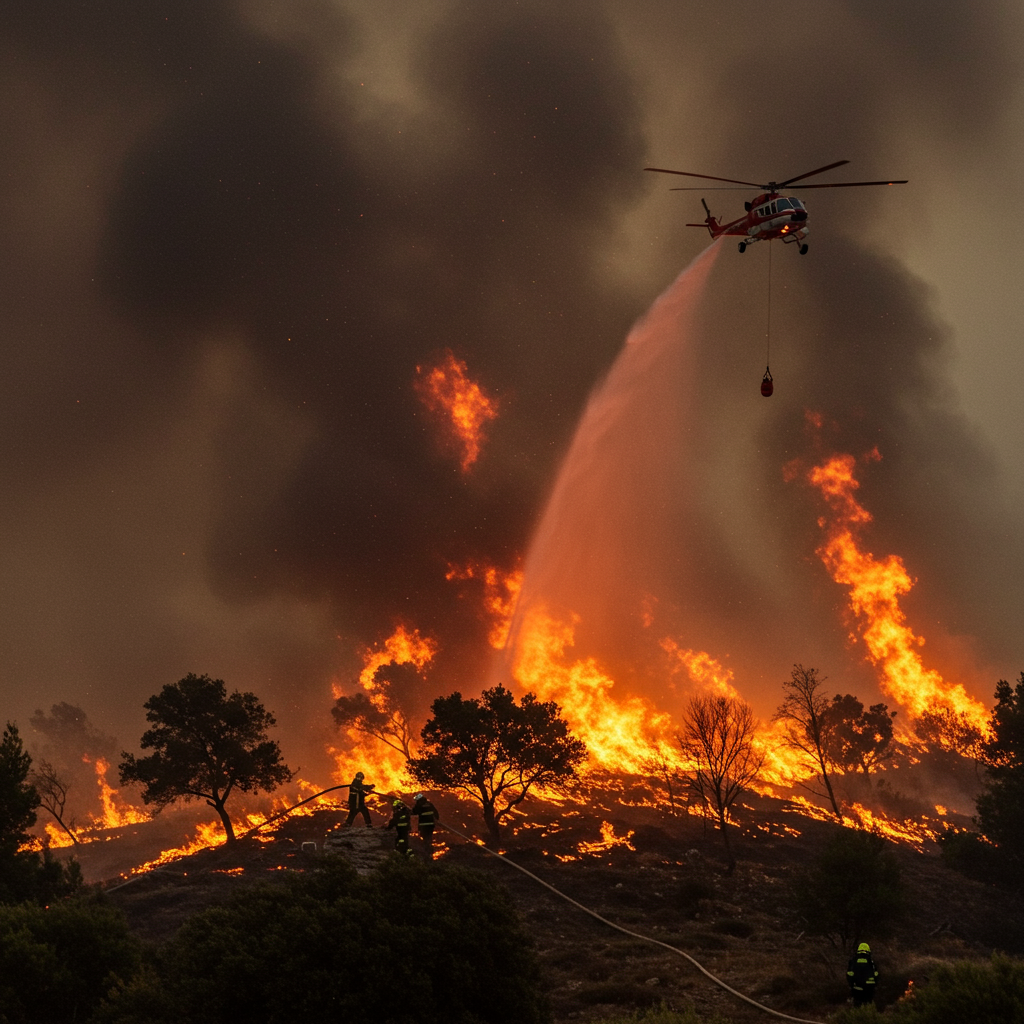Emergency services are battling multiple fierce wildfires across greece and turkey as thousands flee homes and holiday resorts. Blazes near Athens, on the island of Crete, and across Turkey’s Aegean coast have prompted large-scale evacuations and tragically resulted in fatalities in neighboring Turkey. The intense blazes highlight the region’s vulnerability to extreme weather conditions.
Firefighters are deploying significant resources on the ground and from the air. The situation remains critical in several key areas, forcing authorities to issue urgent evacuation orders. The rapid spread of the fires is fueled by strong winds and scorching summer heat.
Greece Battles Multiple Fire Fronts
Greece is currently facing the challenge of containing several significant wildfires burning simultaneously. Emergency crews are stretched across different regions, responding to outbreaks that threaten populated areas and natural landscapes. The focus remains on protecting lives and property.
The fires have disrupted daily life, impacting travel and forcing residents and tourists alike to seek safety. Authorities are coordinating efforts to manage the crisis. Volunteers are also assisting where possible.
Mass Evacuations on Crete’s South Coast
The situation on the island of Crete is particularly challenging. A fast-moving wildfire near the town of Ierapetra, on the southern coast, triggered a massive evacuation. Over 5,000 people were forced to leave the area. This included tourists staying in holiday resorts, hotel workers, and local residents.
The fire spread quickly through dry vegetation. Officials and hotel association representatives confirmed the scale of the displacement. Some individuals near coastal areas had to flee into the sea. Local fishermen and divers bravely rescued these people.
Ierapetra Mayor Manolis Frangoulis described the situation as difficult. He noted that firefighters are working hard to prevent new flare-ups. They are taking advantage of a temporary lull in high winds to gain control. “Thankfully no one was hurt but it’s a difficult situation,” he stated. Displaced individuals found temporary shelter. They were relocated to other hotels or spent the night in an indoor basketball stadium. The fire caused damage to several homes and businesses in the area. Volunteers discovered dead farm animals after the blaze passed. Tragically, some animals were found burned alive, reportedly trapped inside sheds.
New Blazes Erupt Near Athens & Western Crete
Separate wildfire incidents are also demanding significant emergency responses in other parts of Greece. A blaze erupted near the major port of Rafina, situated about 30 kilometers (20 miles) east of Athens. This fire disrupted local ferry services that connect the mainland to the islands. Police officers went door-to-door in affected neighborhoods. They assisted elderly residents with complying with evacuation orders.
Further west, a wildfire ignited in scrubland near Agios Dimitrios in Koropi. This area is located in Eastern Attica, close to Athens. The fire prompted a significant emergency response on Friday, July 4, 2025. The 112 emergency alert system was activated. It warned residents to evacuate several settlements. Fire officials deployed vast resources to fight the blaze. This included 75 firefighters, supported by five ground teams from the elite 1st EMODE unit. They operated with 25 fire engines. Volunteers also joined the battle against the flames. Aerial support was crucial. Four water-dropping helicopters and two fixed-wing aircraft were dispatched. Municipal water trucks assisted ground crews. An urgent evacuation warning was issued around 2 p.m. local time. Residents in Agios Dimitrios, Galazia Akti, and Althea were specifically told to evacuate towards Lagonissi for safety.
On the southern island of Crete, a wildfire also broke out early on Friday, July 4, 2025, near Hania. This blaze ignited in the Agriles area. It prompted a substantial mobilization of local firefighting resources. The fire is actively spreading through a diverse landscape. It affects both farmland and forest areas. Authorities deployed 36 firefighting personnel, including a specialized ground unit from the 19th EMODE forest commandos. Thirteen fire trucks supported ground operations. Two firefighting helicopters provided aerial assistance. The 112 emergency alert system was used here as well. It advised individuals in the vicinity to remain on standby. This suggested a potential need for further action or evacuation based on the fire’s progression.
Wildfires Rage in Turkey, Claiming Lives
Neighboring Turkey is also facing a severe wildfire crisis. A series of blazes has swept across the country, forcing thousands of people to flee. Tragically, these fires have claimed at least two lives, marking the first reported fatalities in this wave of incidents.
Emergency crews are working tirelessly to bring the fires under control. The scale of the situation is immense. Hundreds of wildfires have been reported across Turkey over the past week. They are fueled by conditions similar to Greece: strong winds, extreme heat, and dangerously low humidity.
Fatalities and Ongoing Battles
The fires in Turkey resulted in tragic losses. Near the town of Odemis, a local forestry worker died while attempting to contain a blaze. In the same area, an 81-year-old resident died from smoke inhalation. These incidents underscore the severe danger posed by the fires.
Firefighting efforts continue on multiple fronts. Hundreds of firefighters, supported by aircraft and helicopters, are deployed near Cesme. This is a popular Aegean coastal vacation destination. It is located about 190 kilometers (120 miles) west of Odemis. The fire near Cesme began Wednesday. It necessitated the evacuation of three neighborhoods. It also led to road closures, disrupting local travel. Television footage showed intense flames consuming dry vegetation along both sides of a highway, illustrating the speed and intensity of the blaze.
While most of the fires across Turkey are now reported to be under control, the damage is significant. The blazes have damaged or destroyed approximately 200 homes. The economic and environmental impact is substantial.
Climate Change Intensifies Mediterranean Fire Risk
Wildfires are unfortunately a common occurrence during the dry summer months in both Greece and Turkey. However, experts warn that climate change is significantly intensifying these conditions. It is making fires more frequent, more intense, and harder to control. Record-breaking heatwaves, prolonged droughts, and strong winds create a volatile environment highly susceptible to ignition and rapid fire spread.
The Mediterranean region is identified as particularly vulnerable to the impacts of a changing climate. Rising global temperatures contribute directly to the extreme heat and dryness that fuel these large-scale blazes.
Turkey Addresses Climate Future Amidst Crisis
Against the backdrop of the wildfire crisis, Turkey is also taking legislative steps related to climate change. Late Wednesday, the country’s parliament adopted a landmark climate law. This legislation sets a target of achieving net-zero emissions by 2053. The new law includes measures to establish a carbon market board. This body will oversee efforts aimed at reducing greenhouse gas emissions across various sectors.
This legislative action comes at a critical time for Turkey. Experts note the country is increasingly grappling with severe climate-related issues. These range from searing heatwaves and prolonged droughts to an increasing frequency of floods and other extreme weather events. Gizem Koc, a lawyer with the U.K.-based environmental advocacy group ClientEarth, highlighted Turkey’s vulnerability. “As a Mediterranean country, Turkey is highly vulnerable to climate change,” she stated. She pointed to drought and water stress as particularly striking vulnerabilities. She also noted the increasing frequency of floods and other extreme weather events. The current wildfire crisis serves as a stark reminder of these growing risks.
Frequently Asked Questions
What caused the recent wildfires in Greece and Turkey?
The wildfires in Greece and Turkey are caused by a combination of factors common in the Mediterranean summer. High temperatures, strong winds, and dry conditions create a volatile environment. Experts emphasize that climate change is intensifying these conditions. It makes heatwaves more severe and droughts longer, increasing the risk and intensity of blazes. Human activity, either accidental or deliberate, can often be the initial spark.
Which areas in Greece and Turkey were most affected by the evacuations?
In Greece, major evacuations occurred on the island of Crete, particularly near Ierapetra on the southern coast where over 5,000 people fled. Near Athens, areas around the port of Rafina saw residents evacuated, and in Eastern Attica, specific settlements like Agios Dimitrios, Galazia Akti, and Althea near Koropi were evacuated. In Turkey, thousands fled nationwide. Key affected areas include Odemis and neighborhoods near the popular coastal destination of Cesme, where a large fire forced residents to leave.
How are authorities responding to the wildfires in Greece and Turkey?
Authorities are responding with large-scale deployments of firefighters on the ground. They are supported by significant aerial resources, including water-dropping helicopters and fixed-wing aircraft. Ground teams, including specialized units like Greece’s EMODE commandos, are actively battling the flames. Emergency alert systems, such as Greece’s 112, are used to warn residents and issue evacuation orders. Local municipal services and volunteers are also assisting efforts to protect communities and contain the blazes.
The wildfire situation across Greece and Turkey remains dynamic and dangerous. Firefighters continue their difficult work to protect communities and contain the blazes. Authorities urge residents and visitors in affected areas to remain vigilant and follow all safety instructions. The crisis highlights the urgent need to address both immediate fire management and the longer-term impacts of climate change in the vulnerable Mediterranean region.




